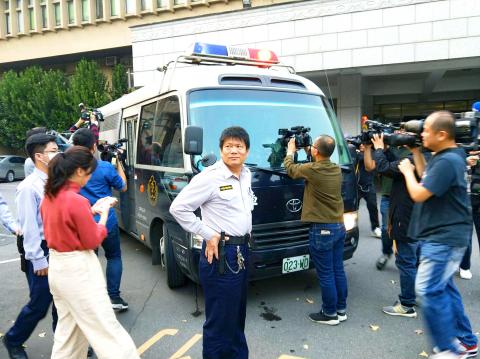Former Democratic Progressive Party (DPP) legislator Gao Jyh-peng (高志鵬) yesterday handed himself in to prosecutors and was taken to the Taipei Detention Center to begin his prison term of four years and six months.
After agreeing to comply, Gao, 55, was accompanied from his residence in New Taipei City’s Sanchong District (三重) to the New Taipei City District Prosecutors’ Office in the early afternoon to sign the required documents.
Gao was then taken to the Taipei Detention Center in a police vehicle.

Photo: Chen Wei-tse, Taipei Times
He is on Thursday to be transferred to Yilan Prison in Sansing Township (三星).
The Supreme Court on Dec. 26 denied his appeal and upheld a 2016 Taiwan High Court ruling that found him guilty of corruption. Gao can no longer appeal the case.
A three-term DPP lawmaker, Gao has been stripped of the legislative seat he won in 2016, representing Sanchong.
The Taiwan High Court in November 2016 upheld a district court ruling which found Gao and his office assistant, Yao Liang-tian (姚糧鈿), who later changed his name to Yao Sheng-chih (姚昇志), guilty of corruption.
The Taiwan High Court sentenced Kao to four years and six months in prison and fined him NT$500,000 (US$16,243 at the current exchange rate) for improper use of influence and receiving an illegal political donation of NT$500,000 in contravention of the Anti-Corruption Act (貪污治罪條例), while Yao was sentenced to 16 months in prison.
In 2006, real-estate agents surnamed Lo (羅) and Chen (陳) approached Yao expressing their interest in renting a plot belonging to the Ministry of Finance’s National Property Administration in Taichung’s East District (東).
The real-estate agents contacted Yao after encountering problems when negotiating with government officials.
After reaching an agreement to rent the land for daytime market use, the company paid a NT$2 million “commission” to Yao.
It was reported that Yao used NT$1 million to pay off personal debts, then put NT$500,000 into his bank account and gave NT$500,000 to Kao as a “political donation” for his campaign fund.
Gao denied the corruption and improper influence charges.
Gao and his lawyer said that Yao conducted his own illegal dealings, then turned against his boss to received a reduced sentence.

A magnitude 4.9 earthquake struck off Tainan at 11:47am today, the Central Weather Administration (CWA) said. The hypocenter was 32.3km northeast of Tainan City Hall at a depth of 7.3km, CWA data showed. The intensity of the quake, which gauges the actual effect of a seismic event, measured 4 in Tainan and Chiayi County on Taiwan's seven-tier intensity scale, the data showed. The quake had an intensity of 3 in Chiayi City and County, and Yunlin County, while it was measured as 2 in Kaohsiung, Nantou County, Changhua County, Taitung County and offshore Penghu County, the data showed. There were no immediate reports of

Weather conditions across Taiwan are expected to remain stable today, but cloudy to rainy skies are expected from tomorrow onward due to increasing moisture in the atmosphere, according to the Central Weather Administration (CWA). Daytime highs today are expected to hit 25-27°C in western Taiwan and 22-24°C in the eastern counties of Yilan, Hualien, and Taitung, data on the CWA website indicated. After sunset, temperatures could drop to 16-17°C in most parts of Taiwan. For tomorrow, precipitation is likely in northern Taiwan as a cloud system moves in from China. Daytime temperatures are expected to hover around 25°C, the CWA said. Starting Monday, areas

The Chinese Nationalist Party (KMT) is maintaining close ties with Beijing, the Democratic Progressive Party (DPP) said yesterday, hours after a new round of Chinese military drills in the Taiwan Strait began. Political parties in a democracy have a responsibility to be loyal to the nation and defend its sovereignty, DPP spokesman Justin Wu (吳崢) told a news conference in Taipei. His comments came hours after Beijing announced via Chinese state media that the Chinese People’s Liberation Army’s Eastern Theater Command was holding large-scale drills simulating a multi-pronged attack on Taiwan. Contrary to the KMT’s claims that it is staunchly anti-communist, KMT Deputy

RESPONSE: The government would investigate incidents of Taiwanese entertainers in China promoting CCP propaganda online in contravention of the law, the source said Taiwanese entertainers living in China who are found to have contravened cross-strait regulations or collaborated with the Chinese Communist Party (CCP) could be subject to fines, a source said on Sunday. Several Taiwanese entertainers have posted on the social media platform Sina Weibo saying that Taiwan “must be returned” to China, and sharing news articles from Chinese state media. In response, the Mainland Affairs Council (MAC) has asked the Ministry of Culture to investigate whether the entertainers had contravened any laws, and asked for them to be questioned upon their return to Taiwan, an official familiar with the matter said. To curb repeated